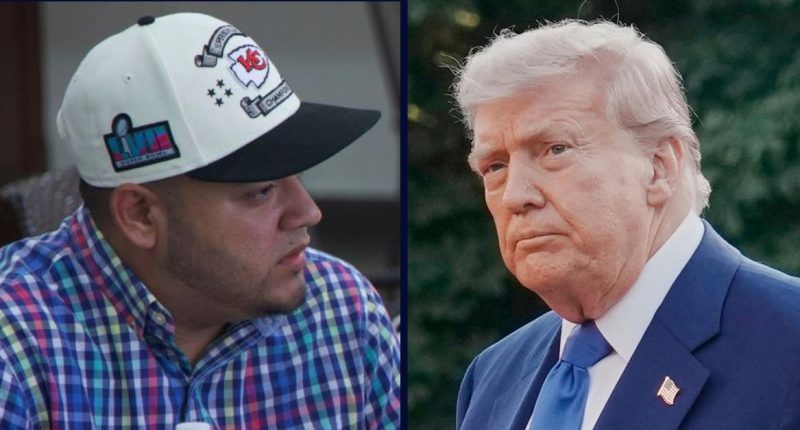Share this @internewscast.com
Left: Kilmar Abrego Garcia, a Salvadoran citizen formerly residing in Maryland, was deported to El Salvador during the Trump administration. Here, he speaks at a hotel restaurant in San Salvador, El Salvador, Thursday, April 17, 2025 (Press Office Sen. Van Hollen, via AP). Right: President Donald Trump arrives for a formal dinner at Paleis Huis ten Bosch, preceding the NATO summit in The Hague, Netherlands, Tuesday, June 24, 2025 (AP Photo/Markus Schreiber).
A Maryland resident whose wrongful deportation became emblematic of the Trump administration’s anti-immigration policy is out of jail and returning home, as confirmed by his defense attorney.
Kilmar Abrego Garcia, 30, left Tennessee on Friday in order to reunite with his family in the Old Line State, attorney Sean Hecker said.
“Today, Kilmar Abrego Garcia is free,” his lawyer stated. “He is on his way back to his family in Maryland, after being wrongfully detained, deported, and imprisoned due to the government’s spiteful actions against a man who dared to oppose the Administration’s persistent attack on the rule of law. He is thankful for the meaningful due process afforded by American courts.”
Abrego Garcia, of course, has two distinct sets of lawyers for his separate-but-intertwined legal cases – one civil and one criminal.
The initial case attracted national attention from the early days of the White House’s third-country deportation initiative that started in March, while the subsequent situation kept the dual plaintiff-and-defendant in pretrial detention at Tennessee’s Putnam County Jail since early June.
Before his return to the U.S., Abrego Garcia was held in El Salvador, spending most of his confinement at a notorious prison known as The Terrorism Confinement Center (CECOT).
Upon his return to the United States, federal criminal charges of human smuggling were filed against him in Nashville. Abrego Garcia has outright denied these accusations, describing the criminal case as selective and retaliatory prosecution. In a recent court filing, his defense team claimed that “top Executive Branch officials are retaliating against Mr. Abrego for contesting his removal and succeeding.”
Immigration officials, for their part, say they intend to deport Abrego Garcia in the event he makes bail in the Volunteer State. But this position has not been consistent across the federal government.
At the same time, the U.S. Department of Justice implored the judge overseeing the criminal case not to grant release – over the fear he would be detained by the Department of Homeland Security (DHS) and subsequently deported again, perhaps back to El Salvador.
In late July, U.S. District Judge Waverly Crenshaw, Jr., a Barack Obama appointee, signed off on the release order, which went into effect on Friday.
And, should the Trump administration attempt to re-deport Abrego Garcia, it must provide at least 72 hours notice of its intent to do so.
The ball is in the government’s court.
If officials attempt to remove him from the country again, they will have to drop the criminal charges. The notice requirement of his release order would give him ample opportunity to throw a legal wrench in the works. And, Abrego Garcia is protected from immigration detention by a separate court order in his civil case.















